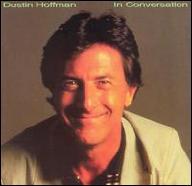Born August 8, 1937 in Los Angeles, Hoffman originally studied to become a doctor, but later focused his attentions on acting, performing regularly at the Pasadena Playhouse alongside fellow aspirant Gene Hackman. Upon relocating to New York City, he worked a series of odd jobs, landing the occasional small television role and later touring in summer stock; frustrated by his lack of greater success, Hoffman once even left acting to teach, but in 1960 he won a role in the off-Broadway production Yes Is for a Very Young Man. After 1961's A Cook for Mr. General, however, he continued to struggle, and did not reappear on-stage for several years, in the meantime studying with Lee Strasberg at the Actors' Studio and becoming a dedicated Method actor. Finally, in 1964 Hoffman appeared in a string of theatrical projects including productions of Waiting for Godot and The Dumbwaiter; two years later he won a Best Actor Obie for his work in The Journey of the Fifth Horse.
In 1967, Hoffman made his film debut with a tiny role in the feature #The Tiger Makes Out; a similarly brief appearance in #Un Dollaro per Sette Vigliachi followed later that same year, as did a highly acclaimed turn in the theatrical farce #Eh? It was here that he was first spotted by director Mike Nichols, who cast him in the lead role in his 1967 black comedy #The Graduate. Though 30 at the time of filming, Hoffman was perfectly cast an alienated college student, and his work won him not only an Oscar nomination, but also made him a hugely popular performer with the youth market. His status as a burgeoning counterculture hero was solidified thanks to his work in John Schlesinger's 1969 Academy Award-winner #Midnight Cowboy, which earned Hoffman a second Oscar bid; while the follow-up, the romance #John and Mary, was a disappointment, in 1970 he starred in Arthur Penn's #Little Big Man, delivering a superb portrayal of an Indian fighter -- a role which required him to age 100 years.
Directed by his longtime friend Ulu Grosbard, 1971's #Who Is Harry Kellerman and Why Is He Saying Those Terrible Things About Me? was Hoffman's first outright failure; he next starred in Sam Peckinpah's harrowing #Straw Dogs, a film which earned harsh criticism during its original release but which, like much of Peckinpah's work, was later the subject of much favorable reassessment. In 1973, Hoffman co-starred with Steve McQueen in the prison drama #Papillon, which returned him to the ranks of box office success before he starred as the legendary standup comedian Lenny Bruce in Bob Fosse's 1974 biography #Lenny, a stunning portrayal which earned him a third Academy Award nomination. Another real-life figure followed as Hoffman portrayed Carl Bernstein opposite Robert Redford's Bob Woodward in #All the President's Men, Alan J. Pakula's riveting docudrama on the Watergate break-in.
Next, Hoffman reteamed with director Schelsinger for 1976's #Marathon Man, which cast him alongside Laurence Olivier and scored another major hit; 1978's #Straight Time, a pet project helmed by Grosbard, was critically acclaimed but a financial disappointment, and 1979's #Agatha pleased neither audiences nor the media. 1979's domestic drama #Kramer vs. Kramer, on the other hand, was a major success with both camps, and Hoffman's portrayal of a divorced father finally earned him an Academy Award on his fourth attempt at the prize. He also won a Golden Globe, as well as honors from the New York and Los Angeles critics. Hoffman's next film, the Sydney Pollack-helmed 1982 comedy #Tootsie, was even more successful at the box office; starring as an out-of-work actor who dresses in drag to win a role on a soap opera, he earned yet another Oscar nomination as the film grossed nearly $100 million during its theatrical release.
After a long absence, Hoffman returned to the stage in 1984 to portray Willy Loman in a Broadway revival of Death of a Salesman; a year later, he reprised the performance for a CBS television special, earning an Emmy and another Golden Globe. He did not return to films until 1987, when he shared top billing with Warren Beatty in Elaine May's disastrous comedy #Ishtar; in the wake of the big-budget project's chilly audience reception, any number of films were discussed as a follow-up, but after much debate, Hoffman finally agreed to co-star with Tom Cruise in Barry Levinson's 1988's #Rain Man. His performance as a middle-aged autistic won a second Best Actor Oscar, and helped spur the picture to become a major financial as well as critical success; the following year Hoffman again turned to Broadway to star as Shylock in a presentation of The Merchant of Venice, followed by the motion picture #Family Business, in which he starred with Sean Connery and Matthew Broderick.
After making an unbilled and virtually unrecognizable cameo appearance in Beatty's 1990 comic strip adaptation #Dick Tracy, Hoffman starred in the 1991 crime drama #Billy Bathgate, the first in a string of films which saw his drawing power gradually diminishing throughout the decade. That same year, he starred as Captain Hook opposite Robin Williams' portrayal of an adult Peter Pan in the Steven Spielberg fantasy #Hook, a major disappointment for all involved; after 1992's #Hero proved similarly lackluster, Hoffman disappeared from the screen for three years. His comeback film, the adventure tale #Outbreak, performed moderately well at the box office, but the follow-up, Michael Corrente's oft-delayed adaptation of the David Mamet drama #American Buffalo, saw only limited release. Hoffman next joined an ensemble cast also including Robert DeNiro and Brad Pitt in Levinson's 1996 drama #Sleepers, trailed a year later by Costa-Gavras' #Mad City. #Sphere and #Wag the Dog followed. ~ Jason Ankeny, Rovi
|
1
|
|
Sphere |
|
2
|
|
Mad City |
|
3
|
|
Crazy Hair Day |












